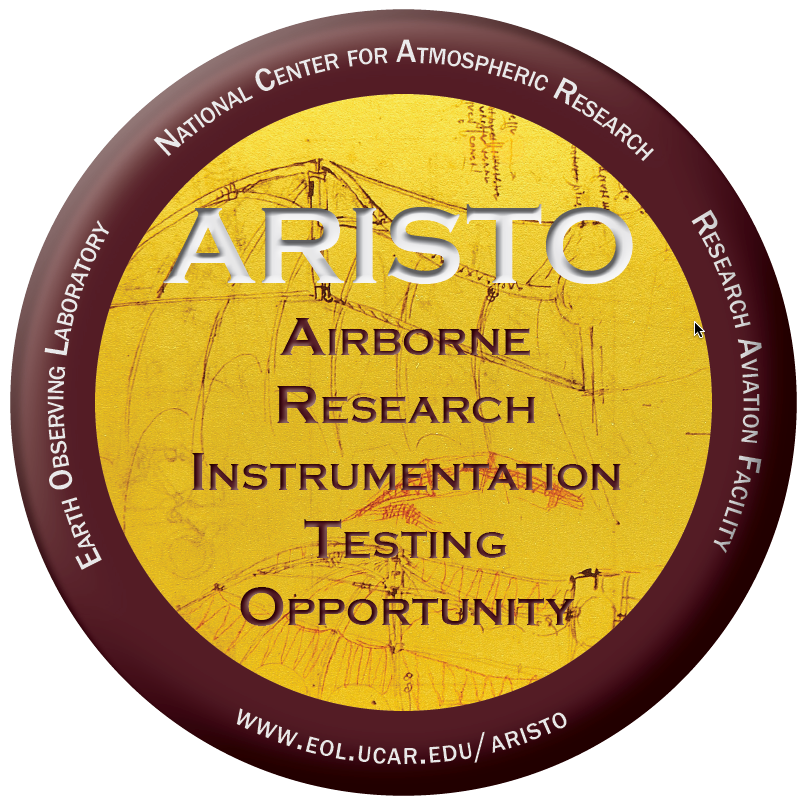ARISTO 2016
Airborne Research Testing Opportunity
ARISTO-2016 Experiment Design
For ARISTO-2016, several instruments were selected that tested unique and updated measurement approaches. The cold flow diffusion chamber is testing the changed flow system, modified re-icing process with common system exhaust and updated software. The MTHP instrument is flying for the first time, and is testing all phases of integration on the C-130, performance in flight and angles of measurement. The PHIPS instrument is verifying performance on the NSF aircraft for the first time. 2D-S and BCPD instruments are also flying for the first time on the C-130, and the BCPD, which is intended to be flown on commercial aircraft, is estimating the changes of aerosol concentration in the boundary lays of the aircraft as compared to the ambient concentration, which is provided by the participating UHSAS and SMPS instruments.
A very significant component of the project is the MARLi lidar from the University of Wyoming. MARLi is a new, sophisticated lidar and this is the first time it is flying on the C-130. A new aircraft power interface system and mounting infrastructure were designed for MARLi.
What is ARISTO?
 The Airborne Research Instrumentation Testing Opportunity (ARISTO) is a newly-created NSF-sponsored flight test program that will be conducted annually on one of the NSF/NCAR aircraft. The purpose of the ARISTO program is to provide regular flight test opportunities for newly developed or highly modified instruments as part of their development effort. The program was created in response to a critical need, expressed by the NSF community, for regularly scheduled flight-testing programs to be able to not only test instrumentation, but also data systems, inlets and software well ahead of a field campaign in order to maintain cutting-edge and vibrant airborne research. Click here to view the original ARISTO proposal.
The Airborne Research Instrumentation Testing Opportunity (ARISTO) is a newly-created NSF-sponsored flight test program that will be conducted annually on one of the NSF/NCAR aircraft. The purpose of the ARISTO program is to provide regular flight test opportunities for newly developed or highly modified instruments as part of their development effort. The program was created in response to a critical need, expressed by the NSF community, for regularly scheduled flight-testing programs to be able to not only test instrumentation, but also data systems, inlets and software well ahead of a field campaign in order to maintain cutting-edge and vibrant airborne research. Click here to view the original ARISTO proposal.
The ARISTO 2016 flight test program will take place in summer 2016 at EOL's Research Aviation Facility (RAF) located at Rocky Mountain Metropolitan Airport (RMMA) in Broomfield, CO. Information on eligibility, proposal submission, timelines, and instrument requirements can be found on this page.
Who is eligible to participate in ARISTO?
All instrument developers/investigators with existing NSF funds related to instrumentation are eligible to apply for access to the NSF/NCAR aircraft for this instrumentation testing. Investigators selected for instrument testing are required to provide appropriate details on their instrument and comply with EOL/RAF certification requirements.
Please note that this flight-testing program is not intended to provide flight opportunities for commercial instrument builders or for the collection of proprietary data for commercial instrument development. Test flight opportunities can be opened to investigators with instrument developments funded by non-NSF U.S. agencies, however those arrangements will have to be negotiated between the cognizant Program Officers.
Proposals will be ranked and instruments will be selected for testing based on the following prioritized criteria:
- Priority 1: Instrumentation that is essential to an NSF-funded or proposed field campaign but that has yet to be test flown and certified on an NSF/NCAR aircraft.
- Priority 2: Instrumentation that has recently been developed or is being modified as part of a funded NSF grant or cooperative agreement.
- Priority 3: Instrumentation that has a high likelihood of being routinely used by the NSF community in future field campaigns.
- Priority 4: Instrumentation that has a high likelihood of being ready for flight-testing and complies with all EOL/RAF certification guidelines.
- Priority 5: Instrumentation that is of high relevance to unfulfilled needs in the Lower Atmospheric Observing Facilities (LAOF) and/or in the U.S. airborne research fleet.
If you have questions on whether or not you are eligible for ARISTO, please contact a RAF Project Manager (raf-pm@ucar.edu).
Key Dates for Instrument Principal Investigators
1 November 2015: Proposal submission period opens
19 February 2016: Proposal submission period closes
1 April 2016: NSF announces final funding decision on ARISTO project
23 May 2016: Instrument certification paperwork due to EOL/RAF
20 June - 29 July 2016: Aircraft integration period (if C-130; if GV, TBD)
24 June - provide HAZMAT documents
1 - 19 August 2016: Flight test period
Click here to see detailed timeline of ARISTO-2016.
Data Manager
EOL Archive, NCAR/EOL/DMS